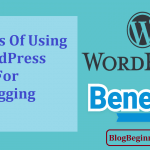The relative accessibility of the Internet has made it easy for people to get into blogging these days. Whether you are a blogger or a reader, blogs are great virtual spaces for fruitful idea exchanges.
While blogging may look as simple as writing regular posts and sharing them on social media accounts, there is actually more to it than that.
Those who make it successfully can tell you that it took them a lot of hard work, guts, consistency, and commitment to get to where they are.
Oftentimes, these bloggers will tell you that putting up a blog is relatively easy. To a certain extent, they are right.
However, before you fully dip your feet into the world of professional blogging, it’s worth learning about some of its benefits and drawbacks. This way, you know exactly what you are getting yourself into.
The Benefits of Blogging Professionally
- Flexible working hours
One of the best perks of working as a professional blogger is the flexible nature of your work process. You can work on your stuff anytime, anywhere — all you need is a stable Internet connection and you’re good to go.
- Exposure to more people
Given that you are executing a carefully thought-out plan for your blog, your content will inevitably reach more people.
Sometimes, it only takes a few interested people for you to get more known in your niche. When they believe in your ideas and share your posts with their friends, more people will be able to get in touch with you.
- Accessible life documentation
In the early days of blogging, people actually did it because they saw it as an online life journal.
They just wrote about what they thought and included images when needed. It still is today, in a way — blogging can be a convenient way of documenting your life and/or your business.
- The opportunity to learn
As you blog, you not only teach people new things but also learn. To be a successful blogger, you have to familiarize yourself with your niche and learn new things that you can teach your followers.
Apart from your niche, you have to educate yourself on different aspects from other fields like online marketing. This information can help you increase traffic on your blog.
Though learning, you grow your knowledge of search engine marketing, email marketing, and even social media marketing.
- Gaining expertise
The more you learn and boost your writing skills, the more expertise you gain. If you are successful in blogging, people may recognize you in your specific niche.
You may even get an invite to participate in blog posts and end up helping people who are trying to be bloggers.
Someone may invite you to be a speaker at a related industry event. Speaking can help build a reputation as a blogger and gain credibility.
- Instant feedback
Whether you are operating a personal blog or blogging for the company you represent, blogging comes with instant feedback.
When you share content with customers and fans on social media, you can easily gauge their opinion regarding your content through the feedback they give in the form of comments.
Not all feedback can be positive, and even negative feedback can help you correct your mistakes.
When you post content on social media platforms, you can get feedback in one day. Instant feedback lets you evaluate the performance of your content.
The Drawbacks of Blogging Professionally
- Flexibility may lead to laziness.
While having a flexible schedule sounds like a dream, it is actually a double-edged sword.
With this kind of setup, it can be easy to fall into the trap of laziness if you fail to have some self-discipline. It’s easy to get distracted if you can’t will yourself into sticking with your productivity goals.
- SEO is still a big deal.
Even if you put out great content, thriving as a professional blogger may still prove to be difficult if your website isn’t ranking well on search engines.
If you want to land on the first page of search results, you need to master the art of SEO (search engine optimization), which isn’t just about throwing in important keywords into your post.
- It’s not a quick way to earn money.
The paychecks of successful bloggers can make it easy for new bloggers to hope that they earn the same after a month or two.
However, professional blogging entails a lot of work behind the scenes.
If you’re thoroughly committed (and lucky), you may start seeing ROIs after 3 months. For others, it may take a year or more to see any significant progress in their paychecks.
- It can be time-consuming
Blogging needs a lot of commitment because it takes time to construct and publish a blog. You may be fast in typing, but blogging involves more than just writing down your ideas.
Constant proofreading and editing are what makes it time-consuming.
If you are new to blogging, it may be slow, but with time, you can move quickly and be able to produce more than one blog post a day. Make sure you allocate enough time for you to plan your posts well every week.
- Loneliness
Most full-time bloggers end up feeling lonely due to working alone for a long time.
Sometimes, having no colleagues to brainstorm ideas with or just talk can make you miss out on social life.
Full-time blogging means you spend most of your time alone, working hard and trying to find new opportunities to grow your work.
The lack of social bonding with others can lead to frustration
To prevent this, you can get a small office and a partner who also does full time blogging for both of you to work together. If you prefer to work from home, try to maintain a balance between your internet and social life.
Instead of spending your spare time on Facebook, go out and meet friends during weekends so that this does not affect you.
Is Blogging for You?
Blogging has the illusion of being easy and laid-back, but the things you have to do behind the scenes will prove that that is not entirely the case.
Still, depending on what your goals are, it can definitely be the fulfilling dream job that you’ve always wanted to have.
Regardless of the possible numbers on your future paychecks, blogging can help you improve the way you express yourself.
It can also expose you to more people across the globe and help you communicate with others better. Ultimately, it’s for you to decide whether blogging is something that you’d love to do for a living or not.
You have to analyse your personality, needs, style, and experience to determine if blogging is for you.
Try to ask yourself the right questions such as how good you are in communicating and what message you would like to share with an audience to evaluate your performance as a blogger.








